 Bets are tricky things. Depending on what it is that you’ve placed your bet on, there are a crazy amount of moving parts that might go the wrong way at any given moment. If you’ve had a flutter on a football match, for example, then any one of twenty-two players on the pitch could do something crazy that throws your bet all out of whack. That’s to say nothing of the man in the middle who might decided to send someone off for no reason. Then, there’s the crowd, who can influence things by doing more than just shouting from the sidelines. I’m thinking, for example, of when a Sunderland fan threw a beachball onto the pitch that deflected a shot past Pepe Reina back in 2009.
Bets are tricky things. Depending on what it is that you’ve placed your bet on, there are a crazy amount of moving parts that might go the wrong way at any given moment. If you’ve had a flutter on a football match, for example, then any one of twenty-two players on the pitch could do something crazy that throws your bet all out of whack. That’s to say nothing of the man in the middle who might decided to send someone off for no reason. Then, there’s the crowd, who can influence things by doing more than just shouting from the sidelines. I’m thinking, for example, of when a Sunderland fan threw a beachball onto the pitch that deflected a shot past Pepe Reina back in 2009.
If your bet involves something longer term than just a one-off match, such as an ante-post bet on the Premier League winner or which politician will win a race for a specific public office, then there are even more moving parts to consider. We accept all of this when we place our bets, of course. We realise that outside influences could cause our bets to go wrong. One thing we never really think about, though, is when the bookmakers get cocky and decide that something is a fait accompli. We all think of bookies as being money hungry, argumentative organisations that will do anything to avoid paying out unless they have to. That’s not always the case though, as countless high-profile examples from the past can show us.
Paddy Power Go Big On City
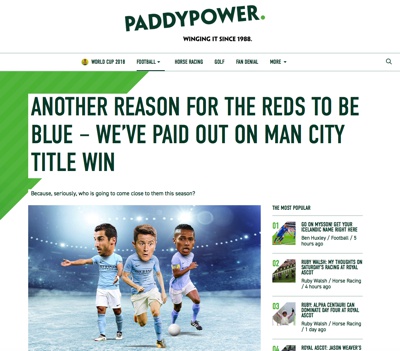 In December 2017, Manchester City had an eight point lead over their neighbours Manchester United heading into the Manchester derby. A win for the Citizens would increase that gap eleven points, with the next closest side being Chelsea fourteen points away and then Liverpool sixteen off the top. Though City’s lead was certainly impressive, less than half of the games of the Premier League season had been played when Paddy Power chose to pay out on Manchester City lifting the trophy.
In December 2017, Manchester City had an eight point lead over their neighbours Manchester United heading into the Manchester derby. A win for the Citizens would increase that gap eleven points, with the next closest side being Chelsea fourteen points away and then Liverpool sixteen off the top. Though City’s lead was certainly impressive, less than half of the games of the Premier League season had been played when Paddy Power chose to pay out on Manchester City lifting the trophy.
At the time of writing, I’m unable to say whether the Irish bookmaker’s decision was a good one or a crazy one as the season isn’t yet over. What I can say is that Newcastle United blew a twelve-point lead that they’d built up by January back in 1996, so it’s not as though it’s a done deal for Pep Guardiola’s side. In 2004, Spanish giants Real Madrid had another twelve point lead but there were just twelve games remaining, whereas City have more than half the season left. Real lost the title that year, so might City do it again?
Why Do They Do It?
As punters, we’re never likely to complain when a bookmaker decides to pay us out early on a bet, especially if it looks like it’s still up in the air when they do so. As much as we won’t complain, though, it’s certainly not unreasonable to ask why, exactly, a bookie might decide to declare our bet a winner before it’s actually reached the state of confirmation. In my opinion, there’s one reason above all others for that particular outcome: publicity.
I don’t think it’s a big coincidence that one of the bookmakers that pays out bets early on a regular basis is Paddy Power. Paddy Power, you’ll know from reading other pages on this site, are a bookie that loves doing things for publicity. First black President in America’s history? Let’s offer odds on when he’ll be assassinated. Oil spill in the ocean? Let’s allow punters to guess which species will be the first to go extinct from it. Those are the sorts of bets that will catch the eye of newspaper editors, who will make big stories out of them and give the bookmaker that offers them a nice chunk of free publicity.
Offering tasteless bets is one thing, but that will only get you attention and newspaper column inches rather than attract customers to sign up with your company. What can bookies do that will tick both boxes? Payout early on high-profile bets. After all, you might not be tempted to bet on various species going extinct, but you certainly wouldn’t mind it if the bookmaker you used put money into your account before a bet had even been settled. You think that the bookie is willing to lose money, forgetting that they’ll have balanced the books to ensure that it doesn’t cost them anything to pay out early when compared to the business that the publicity will earn them.
Of course, there’s also the fact that most bookies know that customers will re-invest their winnings more often than they hold on to them. Sure, paying a punter a load of money on a bet that might turn out to be a loser isn’t great, but when you know the likelihood is that they’ll just give you that money straight back, then it’s not exactly the worst idea ever. Even if only half of all customers place more bets with their winnings, then it will be enough for most bookies to consider it a successful gamble.
The final thing worth mentioning is that paying out early on bets allows bookmakers to say a market is closed without seeming like stinge bags. We’ve all heard the phrase ‘bookmakers have suspended betting’, normally on something that seems as though it’s a done deal like a manager joining a club. If bookies simply suspended betting on something, such as a team winning the league, then it would just seem like they were being tight, whereas paying out early on X winning a certain event means they can close that market at the same time as looking generous. Ultimately, it all comes down to the public optics and what will make them look the best to both current and potential customers. Paying out early will help companies keep the ones they’ve got an attract new ones, which is the definition of a win-win for them.
Examples of When Bookies Have Got Early Payouts Right
Early payouts fit into two categories: the days when the bookies get it right and the times when they get it really, really wrong. Let’s give them some credit and start with examples of when they’ve made the right call with their decisions to go early on declaring a bet a winning one.
Conor McGregor Wasn’t the Pride of the Irish
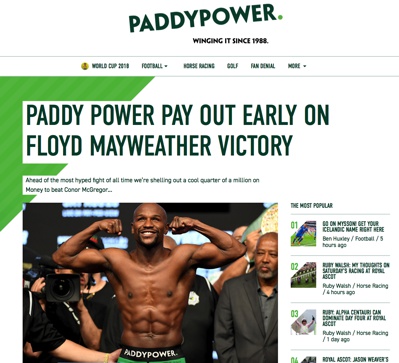 When Mixed Martial Arts champion, Conor McGregor, decided he was going to turn his hand to boxing, few gave him much of a chance. Floyd Mayweather Junior might well have been retired when the Irishman challenged him to a one-off special, but before he hung up his gloves he’d racked up a career record of fifty matches without defeat. That was against professional boxers who had trained for the entire lives to get into the ring, so McGregor never truly stood a chance. Even so, not all bookies were generous enough to pay out on the American winning before a punch had even been thrown, so Paddy Power customers were delighted when money started arriving into their account in return for their bets on Mayweather.
When Mixed Martial Arts champion, Conor McGregor, decided he was going to turn his hand to boxing, few gave him much of a chance. Floyd Mayweather Junior might well have been retired when the Irishman challenged him to a one-off special, but before he hung up his gloves he’d racked up a career record of fifty matches without defeat. That was against professional boxers who had trained for the entire lives to get into the ring, so McGregor never truly stood a chance. Even so, not all bookies were generous enough to pay out on the American winning before a punch had even been thrown, so Paddy Power customers were delighted when money started arriving into their account in return for their bets on Mayweather.
You might have thought that Paddy Power wouldn’t be the bookie to do it, considering McGregor is Irish and the bookmaker has long played on its heritage of being from the Emerald Isle. Nevertheless, payout early they did, combining the publicity they got for doing so with a bit of controversy for the tagline “We Always Bet on Black”. A spokesman for the company confirmed that the fact that the man that they were essentially betting against was Irish was irrelevant when they sat and crunched the numbers, saying “Patriotism aside, we are paying out early on a Mayweather victory – because we checked, and only one of them is a boxer”.
Obama Win Justifies Early Payout
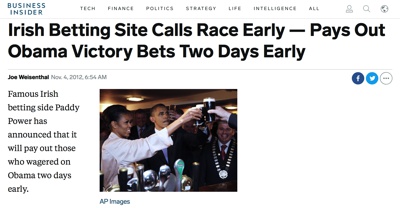 Sticking with Paddy Power again, the bookie got its call right back in 2012 when they paid out on Barack Obama to win reelection. They did it two days before the United States went to vote, at a time when the polls suggested that things were pretty close between Obama and his rival for the top office, Mitt Romney. It resulted in them shelling out around £600,000 and was unquestionably something of a gamble considering that the then President’s odds had dropped to 2/9, their lowest during the campaign.
Sticking with Paddy Power again, the bookie got its call right back in 2012 when they paid out on Barack Obama to win reelection. They did it two days before the United States went to vote, at a time when the polls suggested that things were pretty close between Obama and his rival for the top office, Mitt Romney. It resulted in them shelling out around £600,000 and was unquestionably something of a gamble considering that the then President’s odds had dropped to 2/9, their lowest during the campaign.
We all know what happened next, of course. The Democrat won twenty-six states, as well as Washington DC, earning nearly five million votes more than his counterpart and racking up 332 electoral college votes compared to Romney’s 206. This seemed like a case of what I was mentioning before, with the company deciding to close their book on Obama in a way that would earn them good publicity rather than bad. A spokesman practically confirmed as much, saying “The overall betting trend has shown one way traffic for Obama”.
Betfred Gets a United Call Right For Once
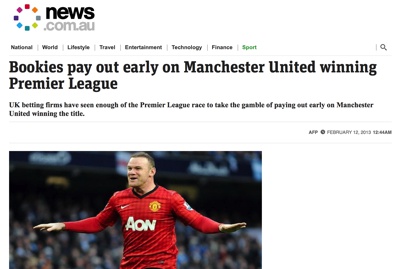 I’ll come on to talk about Betfred’s mistakes shortly, but they got it right in 2013 when they decided to payout on Manchester United winning the title twelve games before the end of the season. When Alex Ferguson’s side established a twelve point lead at the top of the table that was enough of a sign for the Salford-based bookmaker to believe that the Red Devils wouldn’t let it slip, so they rewarded customers who had bet on United by giving them their winnings early.
I’ll come on to talk about Betfred’s mistakes shortly, but they got it right in 2013 when they decided to payout on Manchester United winning the title twelve games before the end of the season. When Alex Ferguson’s side established a twelve point lead at the top of the table that was enough of a sign for the Salford-based bookmaker to believe that the Red Devils wouldn’t let it slip, so they rewarded customers who had bet on United by giving them their winnings early.
Fred Done is a Manchester United supporter and demonstrated his faith in his club’s ability to see off their rivals with his early payout decision, saying “…with United 12 points clear with just 12 games left the title race is over”. Unlike on previous occasions, he got his prediction spot on. In the end, his club side won the title on the 22nd of April after a 3-0 win over Aston Villa, four games from the end of the campaign rather than the twelve Done had made his decision at. He did get something wrong, though, as United actually won it by eleven points rather than twelve. That was to be Alex Ferguson’s last year in charge of the club; something that the bookie had failed to predict.
Examples of When Bookies Have Got Early Payouts Wrong
Let’s be honest, it’s nowhere near as much fun when bookies get their early payout decisions right as when they get them horribly wrong. As punters it’s always great to see bookmakers get snotted, but when it’s their own fault there’s definitely a bit of schadenfreude about it! Here’s a look at when they’ve made big mistakes:
Betfred Get It Wrong on United. More Than Once…
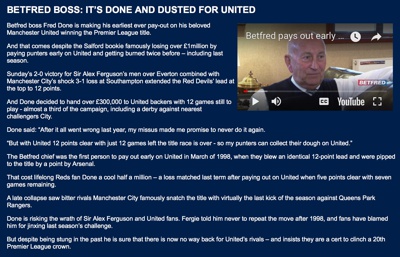 As I mentioned a moment ago, Betfred haven’t always got their calls right when it comes to Manchester United’s ability to see off strong opposition and claim the title. In fact, they’ve got it wrong twice during their existence, starting with the 1997-1998 season. United were twelve points clear of their nearest rival, as they would be fifteen years later, but the difference was that back then Arsenal had three games-in-hand on Alex Ferguson’s side. They won all of them, whilst United dropped points at home to Liverpool and Newcastle. That handed Arsene Wenger his first Premier League title by a point, with Betfred losing £1 million in early payouts.
As I mentioned a moment ago, Betfred haven’t always got their calls right when it comes to Manchester United’s ability to see off strong opposition and claim the title. In fact, they’ve got it wrong twice during their existence, starting with the 1997-1998 season. United were twelve points clear of their nearest rival, as they would be fifteen years later, but the difference was that back then Arsenal had three games-in-hand on Alex Ferguson’s side. They won all of them, whilst United dropped points at home to Liverpool and Newcastle. That handed Arsene Wenger his first Premier League title by a point, with Betfred losing £1 million in early payouts.
You would think that Fred Done would have learnt his lesson there, especially considering that the Manchester United manager told him ‘never to payout early’ on his side again after the 1998 debacle, believing that it jinxed the players. It was not a case of once bitten twice shy, however, with Betfred once again paying out early on a United title win in 2012. They were five points clear of rivals Manchester City at the time, but losses to Wigan Athletic and City themselves meant that the season went down to the final day. Anyone who has ever watched a Sky Sports football trailer will know what happened next, with United’s away win at Sunderland made pointless thanks to Sergio Aguero’s winner in the last minute of the game. The pain for Done was doubled, with City winning their first title and him having already paid out on a losing bet.
Paddy Power Gets Trumped
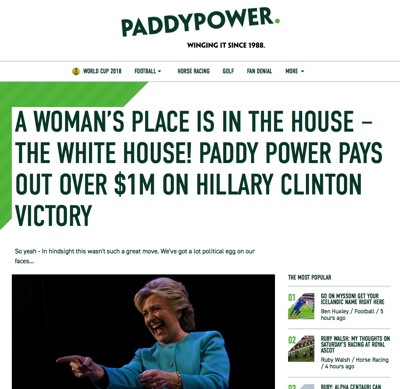 Back to Paddy Power, then, and one of their biggest losses in recent times. The Irish bookmaker was so convinced that Hilary Clinton was going to win the US Presidential Election in 2016 that they paid out on her doing just that, only for Donald Trump to win the electoral college and become the leader of the free world. Their decision to payout on Barack Obama’s victory two days before the election was a risky one, but it made some sort of sense thanks to polling by the likes of FiveThirtyEight’s Nate Silver suggesting he had something like a 90% chance of pulling it off. They paid out on Clinton three weeks before a single lever was pulled, though, at a time when the polls were still within the margin of error.
Back to Paddy Power, then, and one of their biggest losses in recent times. The Irish bookmaker was so convinced that Hilary Clinton was going to win the US Presidential Election in 2016 that they paid out on her doing just that, only for Donald Trump to win the electoral college and become the leader of the free world. Their decision to payout on Barack Obama’s victory two days before the election was a risky one, but it made some sort of sense thanks to polling by the likes of FiveThirtyEight’s Nate Silver suggesting he had something like a 90% chance of pulling it off. They paid out on Clinton three weeks before a single lever was pulled, though, at a time when the polls were still within the margin of error.
The decision to payout early on Clinton cost the bookmaker close to £800,000, with a company spokesman saying “Despite Trump’s Make America Great Again message appealing to many disillusioned voters, it looks as though America are going to put a woman in the White House”. As we know now, that confidence was floored. FBI Director, James Comey, wrote a letter to congress eleven days before voting got underway, declaring that he was reopening the investigation into Hilary’s use of an unsecured server. It’s believed by most commentators to be the turning point of the election, playing into voters’ mistrust of the Clinton family and giving Trump the perfect weapon to attack her with, despite the allegations of sexual assault levelled at him. A heavy loss for both Paddy Power and the United States.
Greek Vote Leaves Bookie Red-Faced
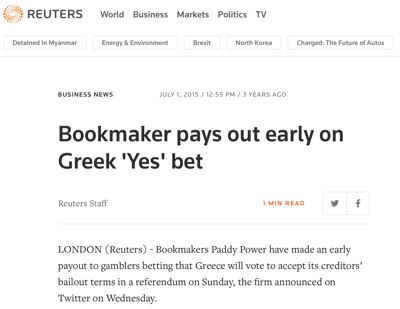 Paddy Power has dominated this piece, so it’s only right that we finish the article by talking about them one last time. This early payout involved the Greek vote at a referendum on whether or not to accept the terms of a bailout deal. The Greek Prime Minister, Alexis Tsipras, believed that he could persuade his people to accept the bailout offer as long as certain conditions were altered, but Germany refused to make the said alterations. Paddy Power believed that the referendum would result in a ‘Yes’ vote, only for the Greeks to resoundingly disagree with them when they took to the polls.
Paddy Power has dominated this piece, so it’s only right that we finish the article by talking about them one last time. This early payout involved the Greek vote at a referendum on whether or not to accept the terms of a bailout deal. The Greek Prime Minister, Alexis Tsipras, believed that he could persuade his people to accept the bailout offer as long as certain conditions were altered, but Germany refused to make the said alterations. Paddy Power believed that the referendum would result in a ‘Yes’ vote, only for the Greeks to resoundingly disagree with them when they took to the polls.
In the end, the result was 61 percent against accepting the bail out deal, which wasn’t too far off where polling suggested the vote would go. A few days before the vote a ProRata institute poll showed that 54% planned to oppose the deal, with only 33% being in favour of it. This seems to me to be about as clear a case as you’re likely to find of a bookmaker paying out early purely for the publicity. They lost a five-figure sum over the early payout, which was unlikely to be much compared to how much they’ll have earned from new customers. A spokesperson said, “Paddy Power is feeling a little red faced this morning after calling the Greek referendum wildly wrong”. Red faced, but very much in the black.
